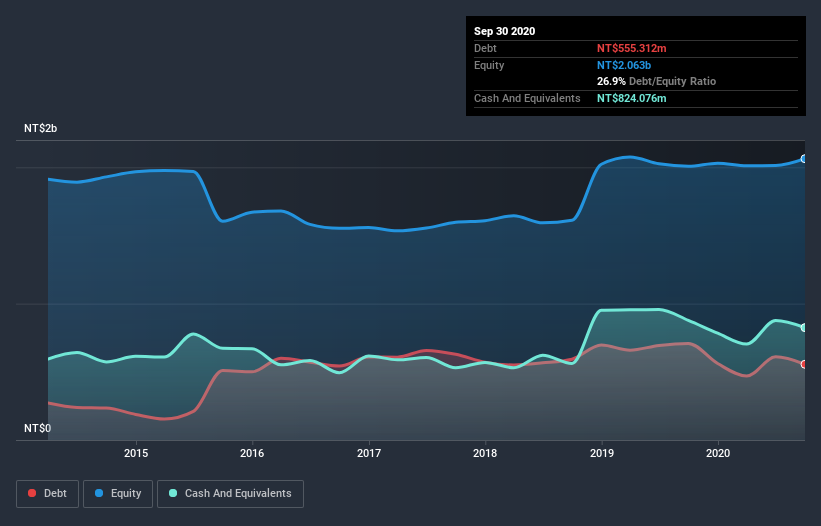
Warren Buffett famously said, 'Volatility is far from synonymous with risk.' So it might be obvious that you need to consider debt, when you think about how risky any given stock is, because too much debt can sink a company. We can see that Apex Medical Corp. (TPE:4106) does use debt in its business. But is this debt a concern to shareholders?
When Is Debt A Problem?
Debt assists a business until the business has trouble paying it off, either with new capital or with free cash flow. Part and parcel of capitalism is the process of 'creative destruction' where failed businesses are mercilessly liquidated by their bankers. However, a more frequent (but still costly) occurrence is where a company must issue shares at bargain-basement prices, permanently diluting shareholders, just to shore up its balance sheet. Of course, debt can be an important tool in businesses, particularly capital heavy businesses. When we think about a company's use of debt, we first look at cash and debt together.
View our latest analysis for Apex Medical
How Much Debt Does Apex Medical Carry?
As you can see below, Apex Medical had NT$555.3m of debt at September 2020, down from NT$708.5m a year prior. However, its balance sheet shows it holds NT$824.1m in cash, so it actually has NT$268.8m net cash.

A Look At Apex Medical's Liabilities
We can see from the most recent balance sheet that Apex Medical had liabilities of NT$921.1m falling due within a year, and liabilities of NT$229.1m due beyond that. Offsetting these obligations, it had cash of NT$824.1m as well as receivables valued at NT$289.8m due within 12 months. So it has liabilities totalling NT$36.4m more than its cash and near-term receivables, combined.
Having regard to Apex Medical's size, it seems that its liquid assets are well balanced with its total liabilities. So while it's hard to imagine that the NT$2.74b company is struggling for cash, we still think it's worth monitoring its balance sheet. While it does have liabilities worth noting, Apex Medical also has more cash than debt, so we're pretty confident it can manage its debt safely.
But the other side of the story is that Apex Medical saw its EBIT decline by 7.1% over the last year. That sort of decline, if sustained, will obviously make debt harder to handle. There's no doubt that we learn most about debt from the balance sheet. But you can't view debt in total isolation; since Apex Medical will need earnings to service that debt. So if you're keen to discover more about its earnings, it might be worth checking out this graph of its long term earnings trend.
Finally, a business needs free cash flow to pay off debt; accounting profits just don't cut it. Apex Medical may have net cash on the balance sheet, but it is still interesting to look at how well the business converts its earnings before interest and tax (EBIT) to free cash flow, because that will influence both its need for, and its capacity to manage debt. Happily for any shareholders, Apex Medical actually produced more free cash flow than EBIT over the last three years. That sort of strong cash generation warms our hearts like a puppy in a bumblebee suit.
Summing up
While it is always sensible to look at a company's total liabilities, it is very reassuring that Apex Medical has NT$268.8m in net cash. And it impressed us with free cash flow of NT$293m, being 120% of its EBIT. So we don't think Apex Medical's use of debt is risky. The balance sheet is clearly the area to focus on when you are analysing debt. However, not all investment risk resides within the balance sheet - far from it. Case in point: We've spotted 2 warning signs for Apex Medical you should be aware of, and 1 of them can't be ignored.
At the end of the day, it's often better to focus on companies that are free from net debt. You can access our special list of such companies (all with a track record of profit growth). It's free.
When trading Apex Medical or any other investment, use the platform considered by many to be the Professional's Gateway to the Worlds Market, Interactive Brokers. You get the lowest-cost* trading on stocks, options, futures, forex, bonds and funds worldwide from a single integrated account. Promoted
Valuation is complex, but we're here to simplify it.
Discover if Wellell might be undervalued or overvalued with our detailed analysis, featuring fair value estimates, potential risks, dividends, insider trades, and its financial condition.
Access Free AnalysisThis article by Simply Wall St is general in nature. It does not constitute a recommendation to buy or sell any stock, and does not take account of your objectives, or your financial situation. We aim to bring you long-term focused analysis driven by fundamental data. Note that our analysis may not factor in the latest price-sensitive company announcements or qualitative material. Simply Wall St has no position in any stocks mentioned.
*Interactive Brokers Rated Lowest Cost Broker by StockBrokers.com Annual Online Review 2020
Have feedback on this article? Concerned about the content? Get in touch with us directly. Alternatively, email editorial-team (at) simplywallst.com.
About TWSE:4106
Wellell
Provides medical solutions for healthcare professionals worldwide.
Flawless balance sheet average dividend payer.
Similar Companies
Market Insights
Community Narratives



